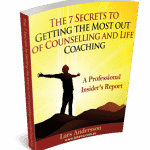The Quest for Happiness
 For some reason I have recently found myself in conversation with several clients about what causes happiness, what makes you happy. Now, the word ‘happy’ may not be everyone’s cup of tea. Some people would see ‘happy’ as at best describing what goes on for people who are squealing full of champagne on New Year’s Eve. Then words such as ‘joyful’, or ‘content’, or ‘serenely satisfied’ may better describe the ‘ultimate state’ they wish for and aspire to. Nevertheless, to make it simple in this article, I will use the terms ‘happy’ and ‘happiness.’ You can translate to whichever words sit better with you.
For some reason I have recently found myself in conversation with several clients about what causes happiness, what makes you happy. Now, the word ‘happy’ may not be everyone’s cup of tea. Some people would see ‘happy’ as at best describing what goes on for people who are squealing full of champagne on New Year’s Eve. Then words such as ‘joyful’, or ‘content’, or ‘serenely satisfied’ may better describe the ‘ultimate state’ they wish for and aspire to. Nevertheless, to make it simple in this article, I will use the terms ‘happy’ and ‘happiness.’ You can translate to whichever words sit better with you.
I will be happy when…
The dominant idea in our society, which may very well have been dominant for centuries, is that happiness comes when the circumstances are ‘right’. That there is something missing in my life. Something that I need to achieve or accomplish before it is possible for me to be happy. The something is typically related to the circumstances of my life. Perhaps I think I need more money, so that I can buy the house that I believe will make me happy to live in, or the car that I want to drive. Perhaps I believe that if I had better health, I would be happy. Perhaps I believe that what is missing is that special person to share my life with. Or the job that would fulfil me. Or just more holidays, (more) children, more friends, more… you name it.
I am still not happy!
While the above may appear to make perfect sense, it just doesn’t seem to work quite like that in real life. I have had many clients over the years, who actually achieved everything that they ever aspired to – believe it or not. People who are pristinely healthy and fit, who turned their hobby into an occupation, formed a family with the man/woman they loved, bought the house they dreamed of, and made stacks of money along the way. Some of them therefore chose to retire at an early age. Others chose not to. Yet, halfway into them telling me how they had fulfilled on their life plan, they would burst into tears and tell me that they were not happy.
Often my response has then been to gently query into how much of their time and energy they had invested into practising being happy. Not into looking forward to being happy. Actually being happy. Usually this would turn their faces into living question marks; “what do you mean?”
Well, I would explain, what you have practised really well over all those years is to look forward to happiness, to look forward to the day when… whatever the goal or goals may have been that would bring happiness. You have practised well and you have become a skilful expert on “looking forward to”. Now there is nothing left to apply your skill to. There are no more goals to achieve. There is nothing else to accomplish that you can believe will make you happy. And your ability to actually be happy is completely underdeveloped.
Circumstances don’t cause happiness
Here is the situation. It doesn’t matter what your life looks like, what you have or don’t have, who you are or who you are not. If you are no good at being happy in the present, whatever your circumstances are like, you will not magically be any better at being happy in the future, regardless what your circumstances are like then. Unless you practise and get better at being happy in the present, in the circumstances as they are now.
See, somewhere in the world there is someone who believes that if they could have what you have, be who you are, then they would be happy. Probably something like 99% of the population on this planet live in circumstances that are nowhere near as comfortable as yours. Are they less happy or more happy? Neither. Or both. They are in the same situation as you and everyone else; they are either good at being happy in the circumstances they are in, or they are no good at it. Nobody’s happiness is determined by how life is for them.
There are people living in appalling circumstances who are happier than some of the millionaires living a life of luxury on tropical islands. And vice versa, of course. There are people who have “everything” and are happy, and there are people who have “nothing” and are happy. There are people who have everything and are unhappy, and there are people who have nothing and are unhappy. And as I heard someone (very rich) say on the subject of financial problems, “the only difference between your problems and mine is that there are many more zeros after mine.”
Basic happiness skills
You can think of being happy as a skill. As with all skills, some people are born with a great talent for that skill. They come with a genetic make-up that makes it easy for them to do whatever it may be; kick a ball, solve mathematical puzzles, match colours, master music, and so on. Good for them. But that is only one aspect of the issue, and far from the whole picture. Added to what you are born with, there is also what you are exposed to and what you put time into developing, how much you practise.
At the base level of practice, you can start from comparing what is with what could be in a negative way. You can stop and consider how much you would miss your arm/leg/health/partner/child/etc., if you lost it/them. And based on that, take a few moments to really appreciate what is in your life now. Not just fleetingly touch on the fact that you have an arm/etc., but stop for a while and actually pay attention to how good it is working for you and all the things you can do with it. Truly connect with your appreciation and gratitude for things being as they are, rather than worse.
Focus on what makes you happy
Like I said, that is the base level of happiness practice, not all there is to it. You don’t really have to compare with the negatives to be happy about the positives. You can intentionally put your attention on the little things in life that by their sheer nature cause you to feel happy. Simple things, such as the giggle of a happy toddler, or the joyful way a puppy dog greets you, or the beauty of glittering reflections of the sun in ripples of water. Again, not just for a fleeting moment, but holding the experience in awareness for a bit longer, to really enjoy it. Even thinking about such things can generate happiness.
You can also, without waiting for a future when there is more of something, engage in activity that increases happiness. And what would that be, you may ask? Well, paradoxical as it may seem, it is not to any large degree about seeking happiness for yourself, but more so about making others happy. When you act out of genuine kindness and caring toward another – not necessarily human or even animal – your own happiness also increases. If you want to feel happier, make someone else happier, for their sake, not for yours.
Being is happiness
Yet, above and beyond all the previous, there is boundless happiness to tap into by simply stopping for a moment to recognise the absolute mystery of existence. To be and recognise how amazing it is that you are; a thinking, feeling entity, experiencing the very experience that you are experiencing right now. Being. Existing. What are the odds of that? Infinity to one. And yet, here you are.
Just stop for a moment, or longer, and notice that you are. Don’t rush past this moment of being. Notice it fully. Become aware of the literally mind boggling reality of being able to experience anything at all. Enjoyable experiences, not so enjoyable experiences. You are that which is experiencing them all. You are the actual experiencing itself. Let this understanding sink into consciousness, past everything you think you know, to where all you are left with is awe. That is where happiness originates from, the core of what you truly are.
In this sense, you don’t really need to practise being happy. But you may need/want to practise stopping. Stopping in the present moment. Stopping in what is. This is actually what mindfulness practice is really about; learning to stop moving your awareness away from what IS.
Be well, and enjoy Being!
If you contact me now, we can have a chat about how I may be able to assist you with this.

